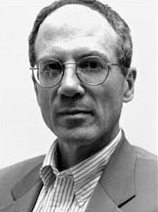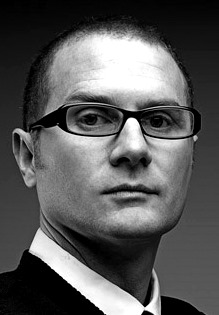 In November 2003 Rob Bell, Jr. spoke at Wheaton College for the annual Staley Lecture Series. His three messages were entitled “Communicating Christ in Contemporary Culture.” Rob Bell is a teaching and founding pastor of Mars Hill in Grandville, Michigan. He is the author of Velvet Elvis and Sex God, and is a coauthor of Jesus Wants to Save Christians. He is also featured in a series of spiritual short films called NOOMA. Rob graduated from Wheaton College in Wheaton, Illinois and Fuller Theological Seminary in Pasadena, California. He and his wife Kristen have three children and live in Grand Rapids.
In November 2003 Rob Bell, Jr. spoke at Wheaton College for the annual Staley Lecture Series. His three messages were entitled “Communicating Christ in Contemporary Culture.” Rob Bell is a teaching and founding pastor of Mars Hill in Grandville, Michigan. He is the author of Velvet Elvis and Sex God, and is a coauthor of Jesus Wants to Save Christians. He is also featured in a series of spiritual short films called NOOMA. Rob graduated from Wheaton College in Wheaton, Illinois and Fuller Theological Seminary in Pasadena, California. He and his wife Kristen have three children and live in Grand Rapids.
The Case of the Modified Memorial

From the 1945 Armed Forces Tower:
The Memorial Student Center is planned to end Wheaton’s shortage of dining hall space. There will be four dining halls and a magnificent, modern kitchen. The building will also house all the student organizations, the Tower, the Record, Student Council, Christian Council as well as the Alumni Association. The basement level will feature a large grill and fountain and a recreation room. There will be several comfortable lounges on the first floor. Small meeting rooms, private dining rooms, at least two literary societies and a devotional chapel designed to seat from thirty to forty people are included in the plans.
Originally projected to stand at the northern end of the quad where the old science buildings, Breyer and Armerding Halls, are located, this spacious, magisterial structure was significantly altered, perhaps due to budgetary constraints, losing its wings, grand portico and other architectural flourishes. As built, the reduced Memorial Student Center is situated on the southern end with its front facing away from the quad; and for over fifty years it contained the STUPE, the Chaplain’s office and several other campus organizations, but no dining hall. A 2006 refurbishment introduced its current use as an academic building housing the Hastert Center, named after J. Dennis Hastert, former Speaker of the House, Politics and International Relations and Business and Economics departments, classrooms and an archive.
Unceasing Worship
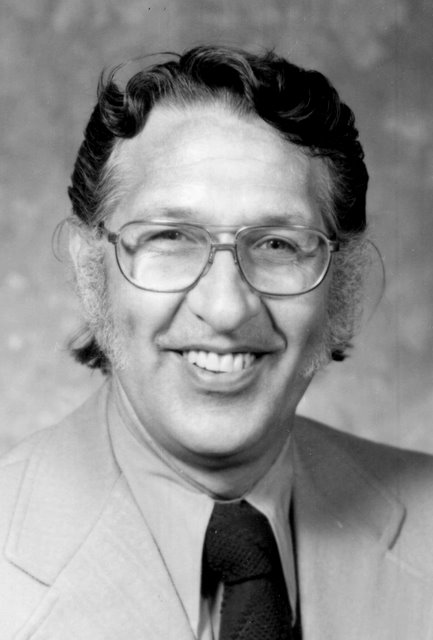 Harold MacArthur Best is Emeritus Dean/Professor of Music of the Wheaton College Conservatory of Music. He received the B.S.M. from Nyack College, the M.A. from Claremont Graduate School, and the D.S.M. from Union Theological Seminary. Dr. Best served as Dean of the Wheaton College Conservatory of Music from 1970 until his retirement in 1997. He is past president of the National Association of Schools of Music, past chairman of the Commission on Accreditation, and former member of the ASCAP Standard Awards Panel. He is the author of numerous articles on the relationship of Christianity to the fine arts, worship, issues in arts education, culture, and curriculum. His books Music Through the Eyes of Faith was published by Harper San Francisco in 1993 and Unceasing Worship: Biblical Perspectives on Worship and the Arts was published by InterVarsity Press in 2003. He also contributed a chapter entitled “Traditional Hymn-Based Worship” in Exploring the Worship Spectrum: Six Views by Zondervan in 2004. He has composed in a wide range of media and styles, and his publications include choral and organ compositions. He is also active at the national level as a lecturer, consultant and workshop leader in the areas of curriculum, accreditation, worship and church music.*
Harold MacArthur Best is Emeritus Dean/Professor of Music of the Wheaton College Conservatory of Music. He received the B.S.M. from Nyack College, the M.A. from Claremont Graduate School, and the D.S.M. from Union Theological Seminary. Dr. Best served as Dean of the Wheaton College Conservatory of Music from 1970 until his retirement in 1997. He is past president of the National Association of Schools of Music, past chairman of the Commission on Accreditation, and former member of the ASCAP Standard Awards Panel. He is the author of numerous articles on the relationship of Christianity to the fine arts, worship, issues in arts education, culture, and curriculum. His books Music Through the Eyes of Faith was published by Harper San Francisco in 1993 and Unceasing Worship: Biblical Perspectives on Worship and the Arts was published by InterVarsity Press in 2003. He also contributed a chapter entitled “Traditional Hymn-Based Worship” in Exploring the Worship Spectrum: Six Views by Zondervan in 2004. He has composed in a wide range of media and styles, and his publications include choral and organ compositions. He is also active at the national level as a lecturer, consultant and workshop leader in the areas of curriculum, accreditation, worship and church music.*
His book Unceasing Worship was featured in the Spring 2004 edition of the Wheaton Alumni magazine and on October 4, 2006, Best returned to Wheaton College and spoke in Edman Chapel.
.
Workout
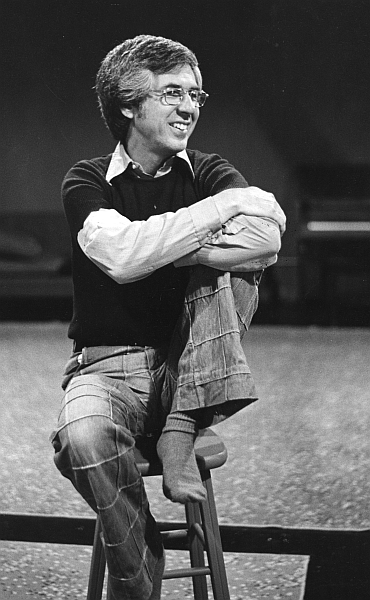 Wheaton’s drama program hold auditions each fall for Theater Workout Group. Commonly known as Workout, its roots began in the work of Professor M. James “Jim” Young and has been at the center of the Arena Theater experience at Wheaton since 1972. Former Workout participant, Mark Hallen, remembered that “the Workout model is a process of theater training, personal development, and spiritual formation that creates an intimate collaborative community that commits to grow, learn, and create together.” Meeting twice a week Workout strives to establish a sense of community and an environment where dramatic skills are developed. Exercises emphasize self-exploration and self-examination. Responding to complaints of the in-depth nature of Workout, Young responded that Workout is to theater what football practice is to the game. Players don’t just show up for the game — they need to work together, train together, and commit themselves to their teammates.
Wheaton’s drama program hold auditions each fall for Theater Workout Group. Commonly known as Workout, its roots began in the work of Professor M. James “Jim” Young and has been at the center of the Arena Theater experience at Wheaton since 1972. Former Workout participant, Mark Hallen, remembered that “the Workout model is a process of theater training, personal development, and spiritual formation that creates an intimate collaborative community that commits to grow, learn, and create together.” Meeting twice a week Workout strives to establish a sense of community and an environment where dramatic skills are developed. Exercises emphasize self-exploration and self-examination. Responding to complaints of the in-depth nature of Workout, Young responded that Workout is to theater what football practice is to the game. Players don’t just show up for the game — they need to work together, train together, and commit themselves to their teammates.
J. Randall Petersen, in his brief history of Workout, stated that “the discipline of the Workout session built strong actors. The intense interaction of the Workout group also built strong bonds. Breathing, speaking, moving, listening, responding, risk-taking — all these valuable stage skills matured in this incubator.” Its “graduates” have gone on to working in community theaters and church drama groups, directing school plays, academic careers in theater and professional acting careers.
Upon Jim Young’s retirement in 1994 Workout’s direction moved to Mark Lewis who placed an even greater emphasis upon community and spiritual development within Workout. The intensity of relationship creates a level of intimacy that Workout alums have found a bond even if they have not met before.
Dispensation of the Mystery
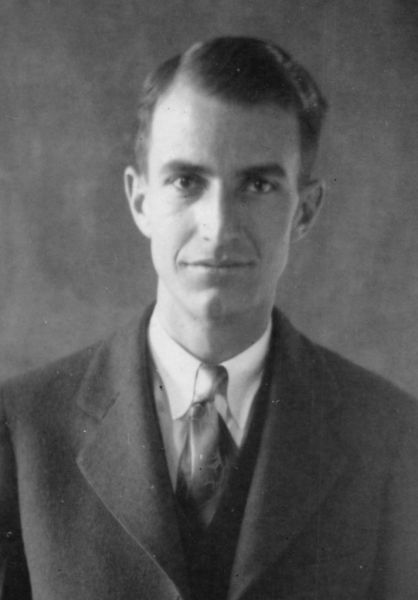 If Charles F. Baker represented an extreme form of dispensational theology, his credentials were impeccable. Born of English immigrant parents in Dallas, Texas, in 1905, he attended Scofield Memorial Church, founded by C.I. Scofield, editor of the Scofield Reference Bible. Baker’s pastor was Lewis Sperry Chafer, who also founded the Evangelical Theological College, which later became Dallas Theological Seminary. Here Baker attended, a highly motivated student, again sitting under Chafer’s ministry. Graduating, Baker entered Wheaton College, accompanied by a letter from DTS registrar Rollin Chafer to Wheaton College registrar Enoch Dyrness. It stated: “Charlie is one of the best students we have ever had in the college and it gives me great pleasure to commend him to your faculty. Not only has his class work been of the highest grade, but he is one of the most spiritual men we have in the institution.” After successful studies at Wheaton Baker moved in 1932 to Milwaukee, Wisconsin, where he ministered for 23 years as pastor of Fundamental Bible Church. He also assisted J.C. O’Hair, pastor of North Shore Church on Wilson Street, Chicago, as chief engineer for broadcasting at station WPCC (We Preach Christ Crucified). In 1939 Baker founded Milwaukee Bible College; and in 1961 moved the school to Grand Rapids, Michigan, where it was called Grace Bible College. Retiring in 1967 he was named President Emeritus and Distinguished Professor of Theology. In 1971 Baker published his 688-page masterwork, A Dispensational Theology. In its preface he wrote: “Very few attempts have been made to produce a work on Theology which is dispensationally oriented. A survey of some two dozen standard works on the subject revealed the fact that more than half of them make no reference whatsoever to the subject of the dispensations. Most of those that do make mention of the Scriptural expression devote only the briefest reference to the subject, and their treatment of it is mainly from the viewpoint of Covenant Theology, which fails completely to recognize the distinctive character of the present dispensation, called by Paul the dispensation of the mystery, a plan and program of God which was kept secret from all former ages and generations (Colossians 1:26). Only one major work on Theology was found which recognized the dispensational principle in the interpretation of Scripture.” After his wife, Teresa, died in 1982, Baker moved to Escondido, California, and was married to a long-time friend, Ruth Lohman Smith, in 1985. Baker’s other books include Understanding the Book of Acts, Dispensational Relationships, and Understanding the Gospels. In addition, he was instrumental in the formation of Grace Gospel Fellowship, Grace Mission and Grace Publications as well as editing two periodicals, the Biblegram and Truth Magazine. He died in 1994.
If Charles F. Baker represented an extreme form of dispensational theology, his credentials were impeccable. Born of English immigrant parents in Dallas, Texas, in 1905, he attended Scofield Memorial Church, founded by C.I. Scofield, editor of the Scofield Reference Bible. Baker’s pastor was Lewis Sperry Chafer, who also founded the Evangelical Theological College, which later became Dallas Theological Seminary. Here Baker attended, a highly motivated student, again sitting under Chafer’s ministry. Graduating, Baker entered Wheaton College, accompanied by a letter from DTS registrar Rollin Chafer to Wheaton College registrar Enoch Dyrness. It stated: “Charlie is one of the best students we have ever had in the college and it gives me great pleasure to commend him to your faculty. Not only has his class work been of the highest grade, but he is one of the most spiritual men we have in the institution.” After successful studies at Wheaton Baker moved in 1932 to Milwaukee, Wisconsin, where he ministered for 23 years as pastor of Fundamental Bible Church. He also assisted J.C. O’Hair, pastor of North Shore Church on Wilson Street, Chicago, as chief engineer for broadcasting at station WPCC (We Preach Christ Crucified). In 1939 Baker founded Milwaukee Bible College; and in 1961 moved the school to Grand Rapids, Michigan, where it was called Grace Bible College. Retiring in 1967 he was named President Emeritus and Distinguished Professor of Theology. In 1971 Baker published his 688-page masterwork, A Dispensational Theology. In its preface he wrote: “Very few attempts have been made to produce a work on Theology which is dispensationally oriented. A survey of some two dozen standard works on the subject revealed the fact that more than half of them make no reference whatsoever to the subject of the dispensations. Most of those that do make mention of the Scriptural expression devote only the briefest reference to the subject, and their treatment of it is mainly from the viewpoint of Covenant Theology, which fails completely to recognize the distinctive character of the present dispensation, called by Paul the dispensation of the mystery, a plan and program of God which was kept secret from all former ages and generations (Colossians 1:26). Only one major work on Theology was found which recognized the dispensational principle in the interpretation of Scripture.” After his wife, Teresa, died in 1982, Baker moved to Escondido, California, and was married to a long-time friend, Ruth Lohman Smith, in 1985. Baker’s other books include Understanding the Book of Acts, Dispensational Relationships, and Understanding the Gospels. In addition, he was instrumental in the formation of Grace Gospel Fellowship, Grace Mission and Grace Publications as well as editing two periodicals, the Biblegram and Truth Magazine. He died in 1994.
Normative, mainstream dispensationalism, as espoused by Dallas Theological Seminary, Moody Bible Institute or Philadelphia Biblical University, might agree with aspects of Baker’s research, but it would vehemently object to many of his assertions. For instance, Baker believed that since Paul does not seemingly mention baptism by immersion after Acts 13, it is not valid for the current dispensation, though the Lord’s Supper should continue to be observed.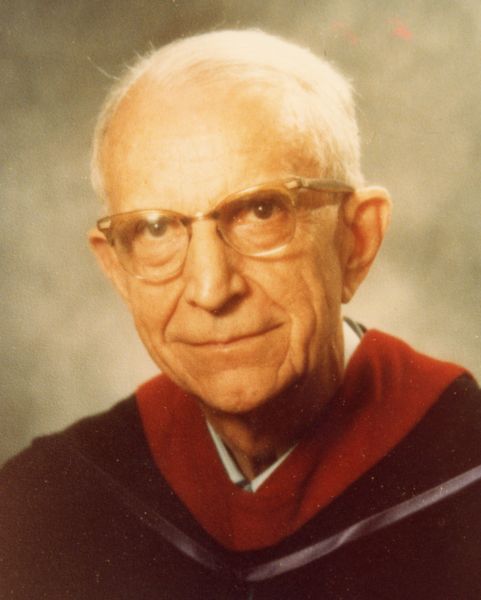 Others, such as E.W. Bullinger and Oscar Baker, held that both baptism and the Lord’s Supper fall outside of the current, post-Acts dispensation, and are not valid church ordinances. Dr. H.A. Ironside, pastor of Moody Church, trustee of Wheaton College and part-time DTS faculty, utters hard words against ultradispensational doctrine in his 1938 apologetic, Wrongly Dividing the Word of Truth: Ultradispensationalism Examined in the Light of Holy Scripture: “I send forth this edition praying that the Lord will use it to deliver many more from the unscriptural and positively harmful teachings of the ultra-dispensationalists who, under the guise of setting forth high truth, are deliberately attempting to rob Christians of the greater part of their Bible.” Despite the controversy attached to his theological stance, Baker was known as a gracious, kindhearted man.
Others, such as E.W. Bullinger and Oscar Baker, held that both baptism and the Lord’s Supper fall outside of the current, post-Acts dispensation, and are not valid church ordinances. Dr. H.A. Ironside, pastor of Moody Church, trustee of Wheaton College and part-time DTS faculty, utters hard words against ultradispensational doctrine in his 1938 apologetic, Wrongly Dividing the Word of Truth: Ultradispensationalism Examined in the Light of Holy Scripture: “I send forth this edition praying that the Lord will use it to deliver many more from the unscriptural and positively harmful teachings of the ultra-dispensationalists who, under the guise of setting forth high truth, are deliberately attempting to rob Christians of the greater part of their Bible.” Despite the controversy attached to his theological stance, Baker was known as a gracious, kindhearted man.
Other prominent ultradispensationalists were Harry Bultema, pastor of Berean Bible Church, and Cornelius Stam, president of the Berean Bible Society and brother of missionary martyr John Stam.
The Beagle
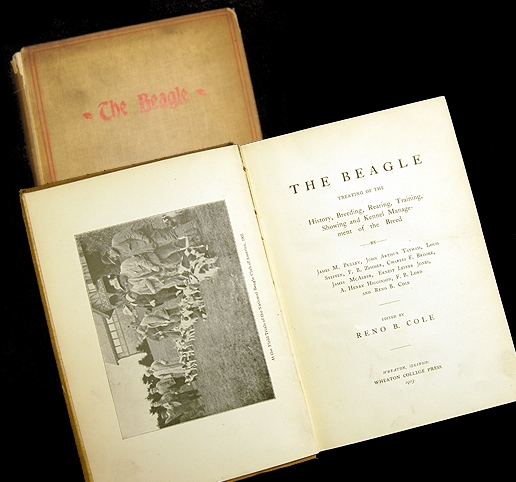 When some here the title The Beagle their minds may be drawn to Charles Darwin, but at Wheaton College this may not be the first thought to emerge. For “Wheaties” the thought should run to The Wheaton College Press, of course. Well, maybe not “of course.” The Beagle: treating of the history, breeding, rearing, training, showing and kennel management of the breed is quite a mouthful and was the result of the editing efforts by Reno B. Cole and was published by the Wheaton College Press in 1903. Cole was enrolled at Wheaton and studied art, science and literature over an eleven year period. After leaving Wheaton he made his way to DeKalb, Illinois. He became an authority on beagles.
When some here the title The Beagle their minds may be drawn to Charles Darwin, but at Wheaton College this may not be the first thought to emerge. For “Wheaties” the thought should run to The Wheaton College Press, of course. Well, maybe not “of course.” The Beagle: treating of the history, breeding, rearing, training, showing and kennel management of the breed is quite a mouthful and was the result of the editing efforts by Reno B. Cole and was published by the Wheaton College Press in 1903. Cole was enrolled at Wheaton and studied art, science and literature over an eleven year period. After leaving Wheaton he made his way to DeKalb, Illinois. He became an authority on beagles.
Few know the history of the Wheaton College Press. However, the staff of the Archives & Special Collections have gathered together a variety of sources to tell its story. 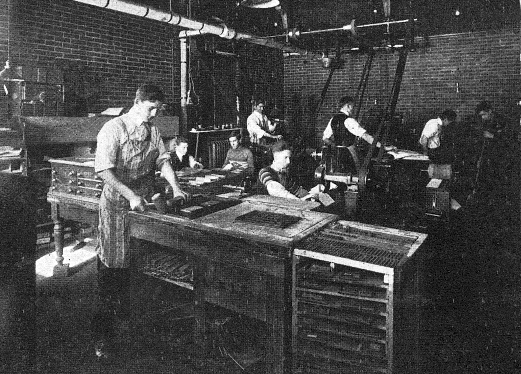 The press was begun when the college received a Marder and Luse press as a donation. Using the model of manual colleges like Knox and Berea colleges had been, Amos Dresser, Jr. and Charles Blanchard envisioned a press that could save the college money as well as employ students. Amos’ son, Ernest, was the first manager. As the press expanded another press and other equipment was added. The press employed nearly two dozen students at its peak. The college used the press to print and publish its own publications, such as the Record, Echo and Catalog.
The press was begun when the college received a Marder and Luse press as a donation. Using the model of manual colleges like Knox and Berea colleges had been, Amos Dresser, Jr. and Charles Blanchard envisioned a press that could save the college money as well as employ students. Amos’ son, Ernest, was the first manager. As the press expanded another press and other equipment was added. The press employed nearly two dozen students at its peak. The college used the press to print and publish its own publications, such as the Record, Echo and Catalog. 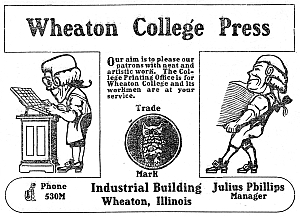 In its last years the expenses outpaced receipts and outside business accounted for less than two percent of revenue. The last known manager was Julius C. Phillips. When he finished college in 1920 and new technologies, such as four color printing and lithography, emerged the press lagged and then remained unused.
In its last years the expenses outpaced receipts and outside business accounted for less than two percent of revenue. The last known manager was Julius C. Phillips. When he finished college in 1920 and new technologies, such as four color printing and lithography, emerged the press lagged and then remained unused.
Below is a bibliography of known titles produced by the press. You will note the wide range of subjects covered.
Dresser, Amos. The Christian Flag. Wheaton: Wheaton College Press, 1894.
Hart, Walter Osgood. Bits of Exegesis. [n.p.]: Wheaton College Press, 1894.
[note: Hart was an alum and Civil War veteran]Monrad, John Henry. A. B. C. in Cheese-Making. A Short Manual for Farm Cheese-Makers. Wheaton, Ill: Wheaton College Press, 1894.
[note: Monrad was a dairy expert with the U.S. Dept. of Agriculture]Wheaton College (Ill.). Echoes. Wheaton, Ill: Wheaton College Press, 1895.
Monrad, J. H. Cheese Making in Switzerland …: Condensed Review of Swiss, German and French Literature, Combined With Observations in Wisconsin Factories. Wheaton, Ill: Wheaton College Press, 1896.
Daniel, Mooshie G. Modern Persia. Wheaton, Ill: Wheaton College Press, 1897.
Adams Memorial Library (Wheaton, Ill.). Catalog of the Adams Memorial Library. Wheaton, Ill: Wheaton College Press, 1901.
Pulley, James M., and Reno B. Cole. The Beagle: Treating of the History, Breeding, Rearing, Training, Showing and Kennel Management of the Breed. Wheaton IL: Wheaton College Press, 1903.
Wheaton College (Ill.). Wheaton College Bulletin. Wheaton, Ill: Wheaton College Press, 1910.
Straw, Darien Austin. Bible Sociology. Wheaton, Ill: Wheaton College Press, 1918.
Scandal of the Evangelical Mind
Over fifteen years ago, noted historian, former Wheaton College professor, and current Francis McAnaney Professor of History at the University of Notre Dame, Mark A. Noll published his book “The Scandal of the Evangelical Mind.” In the intervening years, numerous responses, symposiums, conferences, and even his own reflections have resulted from this work. Some of his earlier thoughts about this topic were recorded when Dr. Noll was installed as the Carolyn and Fred McManis Chair of Christian Thought at Wheaton College. His inaugural lecture also entitled “The Scandal of the Evangelical Mind” was given in Barrows Auditorium on February 9, 1993..
.
A New Generation Coming On
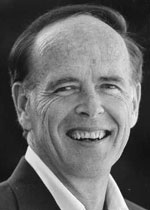 Dr. Tom Sine is a journalist, theologian and Christian futurist who challenged Wheaton College in Edman Chapel on April 12, 1996 with a message entitled “A New Generation Coming On.” While on campus he also promoted his book Cease Fire: Searching for Sanity in America’s Culture Wars as highlighted in the Center for Applied Christian Ethics (CACE) newsletter, Discernment.
Dr. Tom Sine is a journalist, theologian and Christian futurist who challenged Wheaton College in Edman Chapel on April 12, 1996 with a message entitled “A New Generation Coming On.” While on campus he also promoted his book Cease Fire: Searching for Sanity in America’s Culture Wars as highlighted in the Center for Applied Christian Ethics (CACE) newsletter, Discernment.
Sine and his wife, Christine, founded Mustard Seed Associates (MSA) as “a community of Jesus’ followers all over the world striving to create the future one mustard seed at a time. MSA provides resources and a network for committed followers of Jesus to anticipate the future, decode the culture, convey the Kingdom of God, and create new ways of being a difference and make a difference.” They are also adjunct professors at Fuller Theological Seminary. Some of Sine’s other books include Mustard Seed vs. McWorld (1999), Living on Purpose (2004) and The New Conspirators (2008). Correspondence from Sine and a June-July 1984 article about end times eschatology entitled “Bringing Down the Final Curtain” from Sojourners Magazine is also located in the Sojourners Records of the Wheaton College Archives & Special Collections.
.
The most wonderful experience of my life….
J. Northcote Deck, born in England in 1875, pursued his education in Australia at the University of Sydney, where he felt a call to ministry. Thereafter he allowed nothing to compete with his single-minded dedication to Christ. Receiving the degree of Master of Surgery, Dr. Deck established a practice in Sydney; but soon he moved to the Solomon Islands as a full-time missionary and engineer, participating in a fruitful work that began in 1882 among South Sea islanders. In 1910 Dr. Deck was the first white man to cross Guadalcanal, then largely unexplored. He led the first exploration of the coral island of Rennell. He then  embarked upon the first crossing of mountainous Malaita, a cannibal island; and on his second visit he discovered a lake and primitive civilization unknown to the outside world. As a result of these exploratory adventures, he was honored by the Royal Geographical Society and made a fellow of the Royal Geographical Society. Encountering disease, weather, poison arrows and innumerable disappointments, Dr. Deck prevailed in his efforts among the natives until retirement in 1927. On the mission field his life of sacrificial service yielded many conversions. But this was true in his latter years, as well, as he traveled around the world, preaching in churches, summer schools, colleges and conferences, including the Keswick Convention in England, which attracted internationally renowned pulpit orators. In addition to speaking, Dr. Deck wrote devotional books, conveying through the written word a consecrated spirituality. This gift was passed to his daughter, Luci Shaw, who has written perceptively in both poetry and prose about faith and art and other issues of the Christian life. In private Dr. Deck was a man of deep prayer, systematic and definite as he daily remembered missionaries positioned around the globe. As he lay on his deathbed, he joyfully, confidently exclaimed to Wilber Sutherland, director for InterVarsity Christian Fellowship, Canada, “Wilber, this is the most wonderful experience of my life!”
embarked upon the first crossing of mountainous Malaita, a cannibal island; and on his second visit he discovered a lake and primitive civilization unknown to the outside world. As a result of these exploratory adventures, he was honored by the Royal Geographical Society and made a fellow of the Royal Geographical Society. Encountering disease, weather, poison arrows and innumerable disappointments, Dr. Deck prevailed in his efforts among the natives until retirement in 1927. On the mission field his life of sacrificial service yielded many conversions. But this was true in his latter years, as well, as he traveled around the world, preaching in churches, summer schools, colleges and conferences, including the Keswick Convention in England, which attracted internationally renowned pulpit orators. In addition to speaking, Dr. Deck wrote devotional books, conveying through the written word a consecrated spirituality. This gift was passed to his daughter, Luci Shaw, who has written perceptively in both poetry and prose about faith and art and other issues of the Christian life. In private Dr. Deck was a man of deep prayer, systematic and definite as he daily remembered missionaries positioned around the globe. As he lay on his deathbed, he joyfully, confidently exclaimed to Wilber Sutherland, director for InterVarsity Christian Fellowship, Canada, “Wilber, this is the most wonderful experience of my life!”
The papers of Luci Shaw (SC-46) and the Keswick Convention (SC-30) are maintained in Wheaton College Special Collections.
America’s Town Meeting of the Air
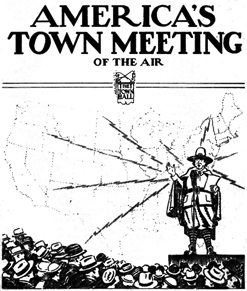 Attempting to hearken back to the town meetings of yore, America’s Town Meeting of the Air was a public affairs radio broadcast and one of radio’s first talk shows. Beginning as an experiment by the National Broadcasting Company, the program had a discussion format that tried to interest the public in current events and ran from 1935 to 1956. Providing a venue for opposing viewpoints, the program’s goal was to create a new kind of educational program that was entertaining and intellectually stimulating. It’s well-known guests were experts on the topic of the broadcast and the audience was encouraged to participate, especially to submit brief question without rudeness or insults, though sarcasm easily seeped in. The success of the program was the audience participation and their challenging questions, though some audience members became belligerent or expressed patently racist views. The program became so popular that a monthly column was written for Current History magazine and a synopsis of the weekly program’s content was disseminated to public school civics teachers. Among the topics of discussions were “Which way America: Fascism, Communism, Socialism or Democracy,” “Does America have freedom of the press,” “Is censorship sometimes necessary,” “Should The U.S. enter World War II?” Due to changes at NBC and the times the program was aired the show went through a long period of steady decline. The moderator, George V. Denny Jr., was replaced in 1952 and the show ended in mid-1956.
Attempting to hearken back to the town meetings of yore, America’s Town Meeting of the Air was a public affairs radio broadcast and one of radio’s first talk shows. Beginning as an experiment by the National Broadcasting Company, the program had a discussion format that tried to interest the public in current events and ran from 1935 to 1956. Providing a venue for opposing viewpoints, the program’s goal was to create a new kind of educational program that was entertaining and intellectually stimulating. It’s well-known guests were experts on the topic of the broadcast and the audience was encouraged to participate, especially to submit brief question without rudeness or insults, though sarcasm easily seeped in. The success of the program was the audience participation and their challenging questions, though some audience members became belligerent or expressed patently racist views. The program became so popular that a monthly column was written for Current History magazine and a synopsis of the weekly program’s content was disseminated to public school civics teachers. Among the topics of discussions were “Which way America: Fascism, Communism, Socialism or Democracy,” “Does America have freedom of the press,” “Is censorship sometimes necessary,” “Should The U.S. enter World War II?” Due to changes at NBC and the times the program was aired the show went through a long period of steady decline. The moderator, George V. Denny Jr., was replaced in 1952 and the show ended in mid-1956.
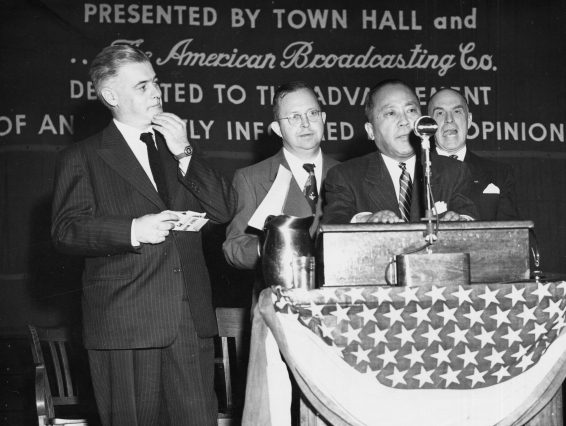 In 1952 America’s Town Meeting of the Air made its way to Wheaton College. The topic of the broadcast was “What is the answer for Korea” and Dr. Orville Hitchcock of the University of Iowa served as the moderator for the meeting. Dr. You Chan Yang, South Korean Ambassador to United States, Mr. Walter O’Hearn and Congressman Orland K. Armstrong of Missouri represented the various positions. Mr. O’Hearn was executive editor of the Montreal Star and represented the “left” position, while Armstrong, who also served on the editorial board of Reader’s Digest, represented the “right.”
In 1952 America’s Town Meeting of the Air made its way to Wheaton College. The topic of the broadcast was “What is the answer for Korea” and Dr. Orville Hitchcock of the University of Iowa served as the moderator for the meeting. Dr. You Chan Yang, South Korean Ambassador to United States, Mr. Walter O’Hearn and Congressman Orland K. Armstrong of Missouri represented the various positions. Mr. O’Hearn was executive editor of the Montreal Star and represented the “left” position, while Armstrong, who also served on the editorial board of Reader’s Digest, represented the “right.”
The National Archives houses dozens and dozens of recordings from the broadcast, including the Wheaton-hosted event in the New York University Collection, 1935 – 1954.
